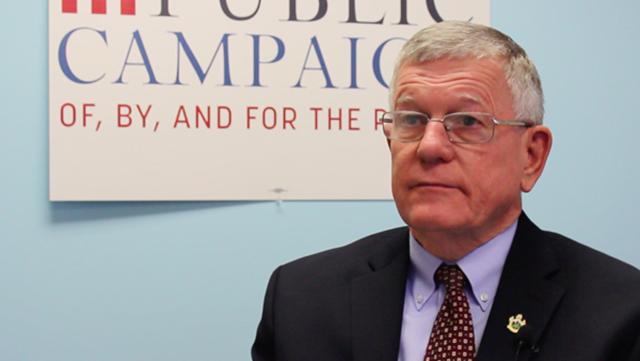This post first appeared at Every Voice.

Sen. Ed Youngblood (Photo: Every Voice)
Sen. Ed Youngblood is currently serving his third term in the Maine State Senate. A Republican representing 22 communities in central Maine, Youngblood has run all three times using Maine’s Clean Election system. We spoke with Sen. Youngblood on running as a Clean Election candidate before and after recent court decisions, and what comes next for the Maine Clean Election act. This interview has been edited for length and clarity.
How did you get your start in politics? Had you always wanted to be a politician?
Sen. Ed Youngblood: When they came and recruited me, I had never even considered running for the legislature in my life. I was busy — actively involved at Bangor Savings Bank as a senior vice president, responsible for a great many areas, and no thought at all of leaving to run for the legislature. Women always get you in trouble in this world, and a group of three or four women came to me and said: “Ed, we’d like to have you run for the legislature.” And ultimately they talked me into doing it.
That was in 2000, the first year of the new Maine Clean Election program and without it, I would not have run for the legislature.
I had sat on multiple fundraising efforts in central Maine — everything from hospitals to YMCAs, YWCAs, United Way, hockey programs, Boy Scout programs, you name it. So I considered myself pretty well-connected to the sources of funds. I could have easily raised the money as a traditional candidate but I did not want to be responsible to any of them for anything should I get elected.
I never thought I’d get elected because the person I ran against had been the mayor of the city of Brewer, had been on the Brewer city council for years, had spent 16 years in Augusta in the legislature, and I was pretty sure people would send him back again. Well, much to my surprise, I was victorious.
I used the Clean Election program again in 2002, and again was successful. After that, I had to leave the legislature because of a terminal illness that my wife had and I was out for eight years.
When you ran again in 2012, the Maine Clean Election had been seriously weakened. How did it change the way you ran?
Sen. Ed Youngblood: In 2012 they talked me into running again. This time, there were no extra funds for when the opponent spent — or overspent — more than the basic amount. So you did have to do a lot of different planning. Up until that time, 85 percent of the Maine legislature — Republicans and Democrats and Greens and Independents — was elected using the Clean Election program. It now has dropped to about 50 percent. All because of matching funds having been taken away and not having the ability late in the campaign to respond to things that might have been said about you. That needs to be fixed and in Maine we’re fixing it with some new legislation.
But it works! Every time that I knocked on someone’s door, I told them that I was running using the Maine Clean Election program, and I never had anyone in all that time say to me ‘oh, well I’m not voting for you.”
How has the Clean Election program changed the legislature?
Sen. Ed Youngblood: Maine today has more more women in the legislature, more blue collar workers in the legislature, more independents in the legislature, and many, many more people who never thought they would run for office — all directly attributable to the Clean Election program.
People automatically used to feel that you had to be well connected, have a party affiliation, that you had to work for the party over the years and now you’ve earned your stripes and now they’ll help you get elected. With a Clean Election program you don’t need to be committed to anyone. You can be yourself, you can be an independent, and have only one thing in mind — a concern for government’s accountability to its citizens.
Why did you choose to run as a Clean Election candidate?
Sen. Ed Youngblood: I’ve had more people over the years say “Ed, you don’t need to do this. We’ll help you raise the money.” I know that I could get money, having worked for the largest savings bank in the state of Maine, well connected to the broker community, well connected to the bankers associations. Raising money would not have been a difficulty.
People think, “well, the $375 that I get from the Maine bankers, that isn’t gonna sway me.” But back in the back of your mind, every time a vote comes up for the Maine bankers, a vote that they’re endorsing, you can’t help but be subconsciously thinking “they gave me money last year, and I’m gonna need to get some money from them next year when I run again.” It may or may not have influenced you, but it’s there playing somewhere in the back of your mind, it has to be. And I think, absolutely, to some degree, it does make a difference.
The Clean Election program does two things. Well, it does more than that, but it does two major, major things. It stops you from being committed to special interest groups, and it forces you to go out and knock on doors and meet the public.
When I first ran, I had no idea what I was doing. I live in Brewer, which is the largest community in my district. I didn’t want to start by knocking on doors in Brewer, because if I fell on my face the word would get around! I said, “I’m going out in the country, where nobody knows me, and if I look like an idiot there, I’ll have a chance to improve.”
So, I had practiced my speech in front of the mirror. I chose to go to the little town of Aurora. I knocked on a door, and I was fortunate enough that one of the first doors that I knocked on an elderly lady came to the door and I said “Hi, I’m Ed Youngblood, and I’m running for the Maine Senate because –” and she said “Oh, stop, stop. Come in. Sit down.” She had a glassed in porch and we went in and sat down, and I’m ready to go right into my speech. I said “I’m Ed Youngblood and I’m running for Maine Senate because –” and she said “I don’t care why you’re running. I want to look you in the eye and see if I can trust you to make decisions for me.”
Well, I’m not very smart, but I learn fast and that’s really what people want to do. They want to look you in the eye.
What’s next for the Maine Clean Election program?
Sen. Ed Youngblood: I sponsored a bill last year to do a number of different things, including changing a lot of parts of the Maine Clean Election act. That would allow a person running for the Senate to get a basic distribution of about $20,000 but do some additional things to get additional qualifying contributions that will allow them to get up to $60,000 from the program — more than is necessary to run a successful campaign in the state of Maine, even against the harshest competition.
It failed — it did not get through the legislature. Not by much, but it didn’t make it. So the alternative to that is going out to the citizens. We needed about 58,000 signatures to make that happen. At the most recent election that we had in November, over 1,000 people were scheduled to be at 205 different polling locations in the state of Maine and our goal for that day was 65,000 signatures. We ended up, after that one day, at 119 percent of our goal for that day. So that, along with other signatures that we had gotten back in the primary period and so forth, we’re well over 85,000 signatures and we only need 58,000 to get it on the ballot in 2015. It was so successful it was amazing.
People are saying ‘We can’t compete. I feel like not voting. I can’t compete with big money, I can’t compete with special interest groups, so I might just as well stay home.” We need to be returning to a government of, by, and for the people.


